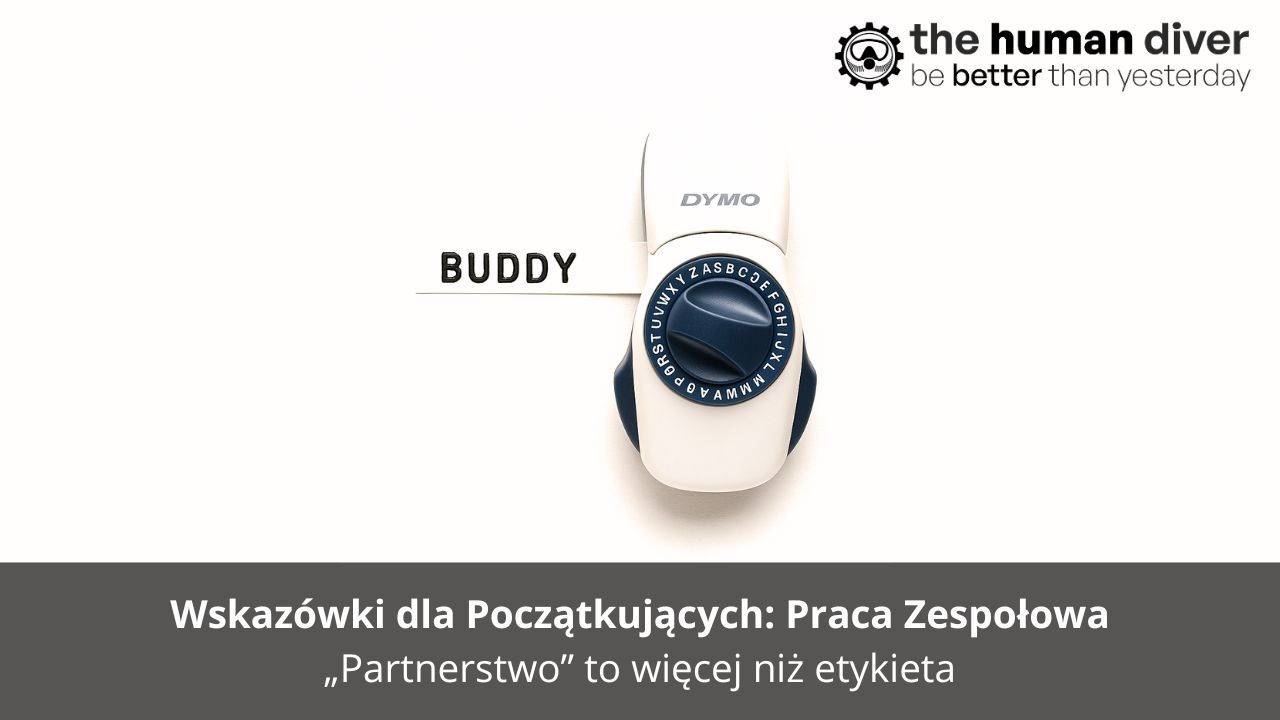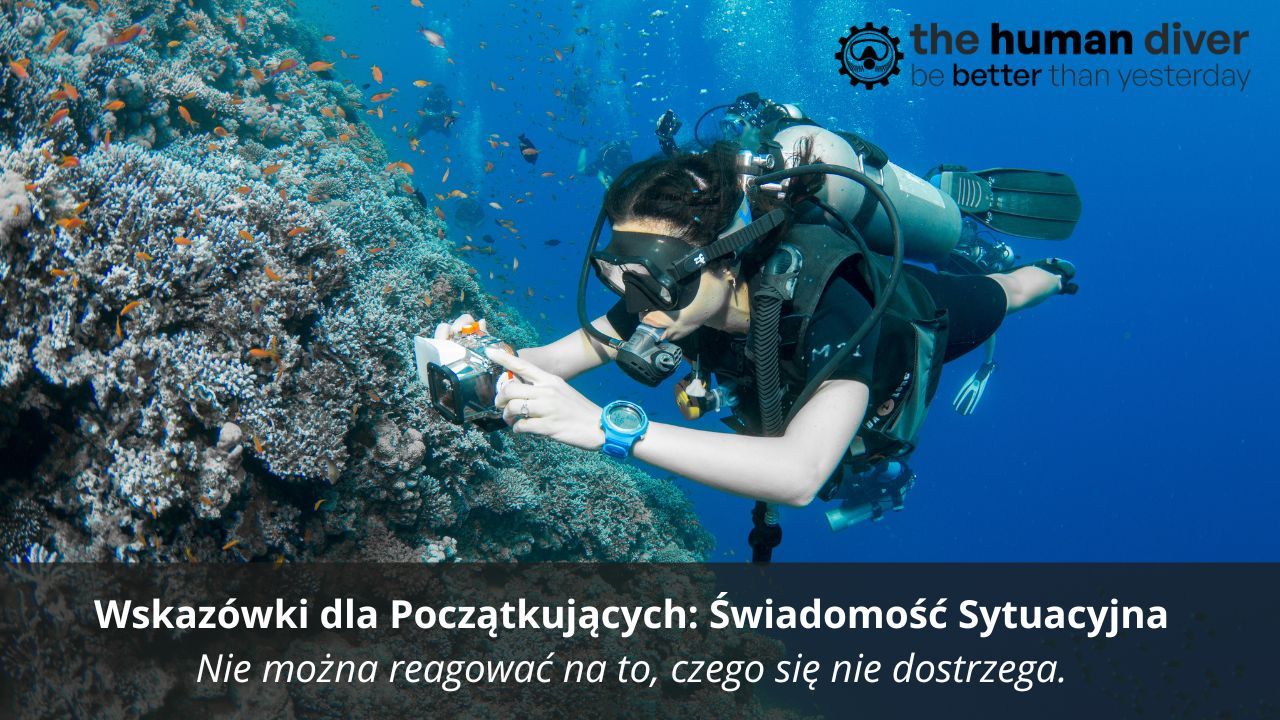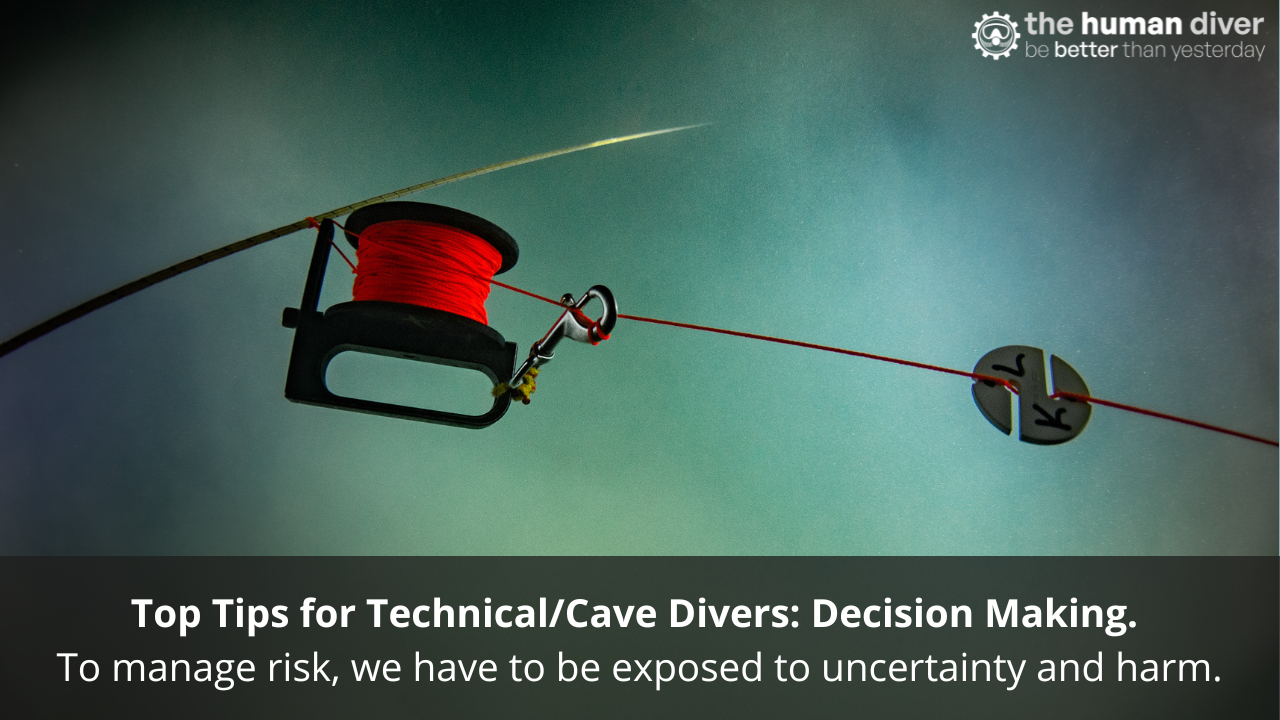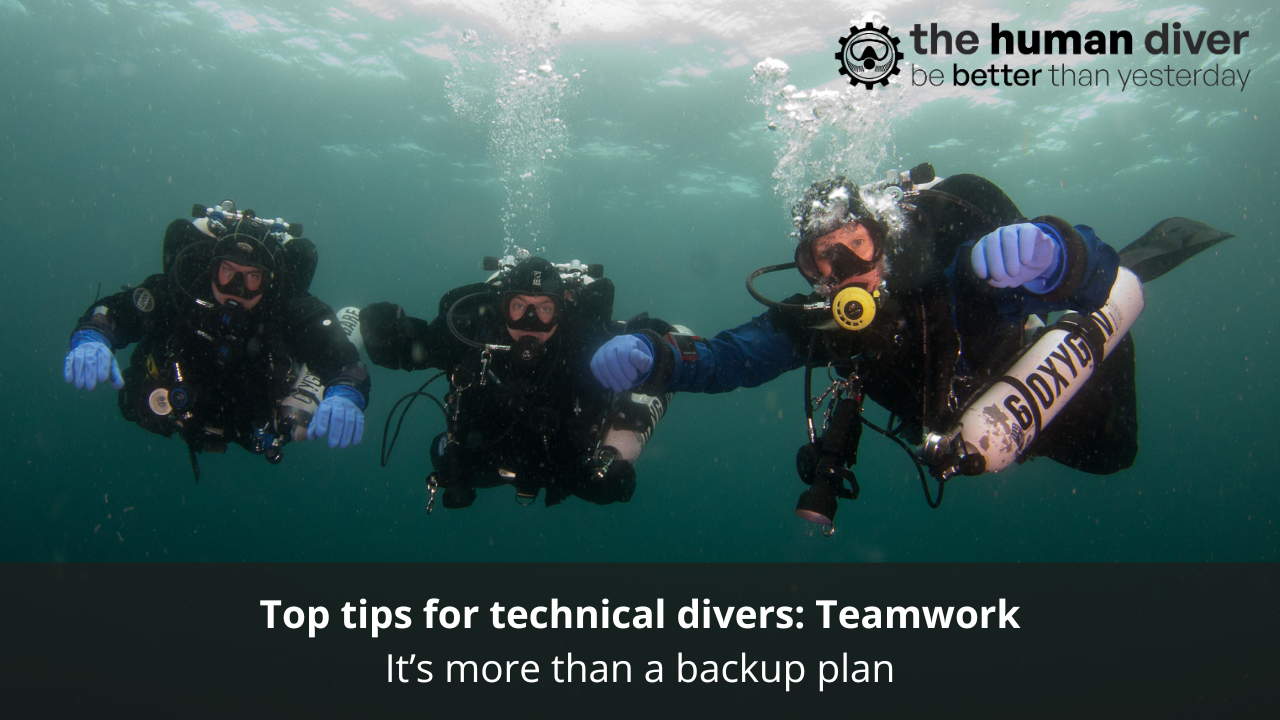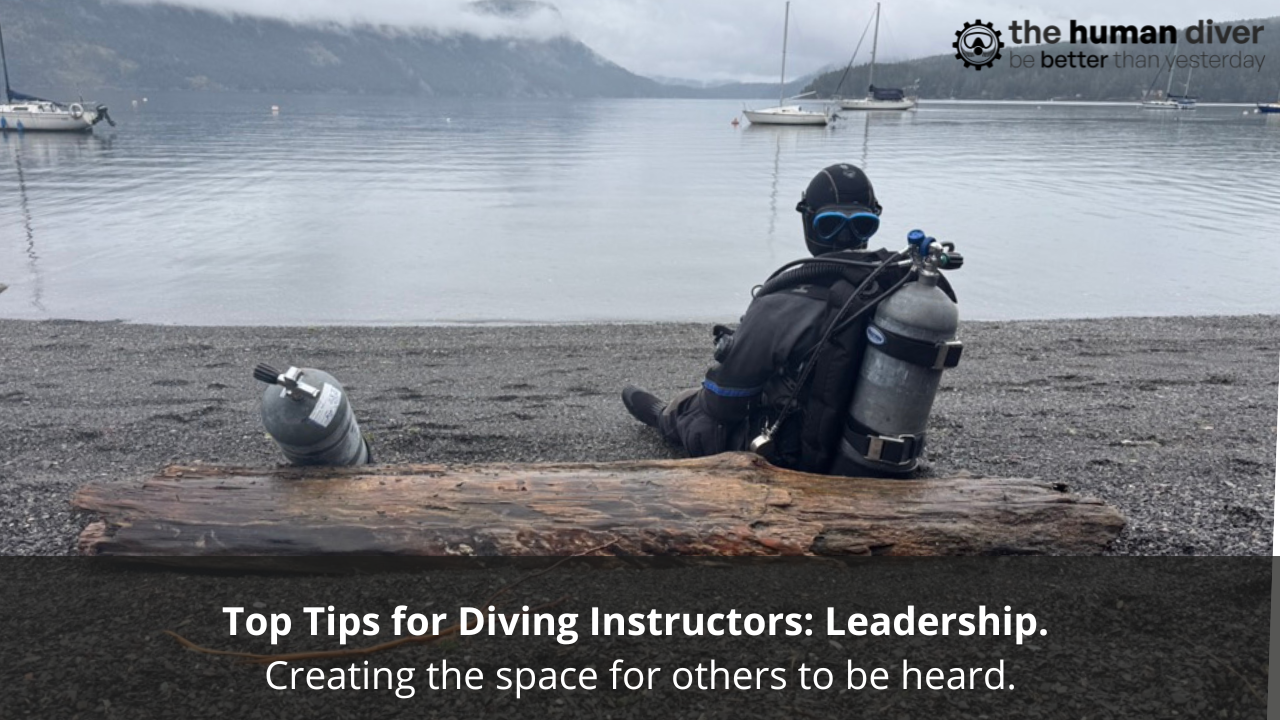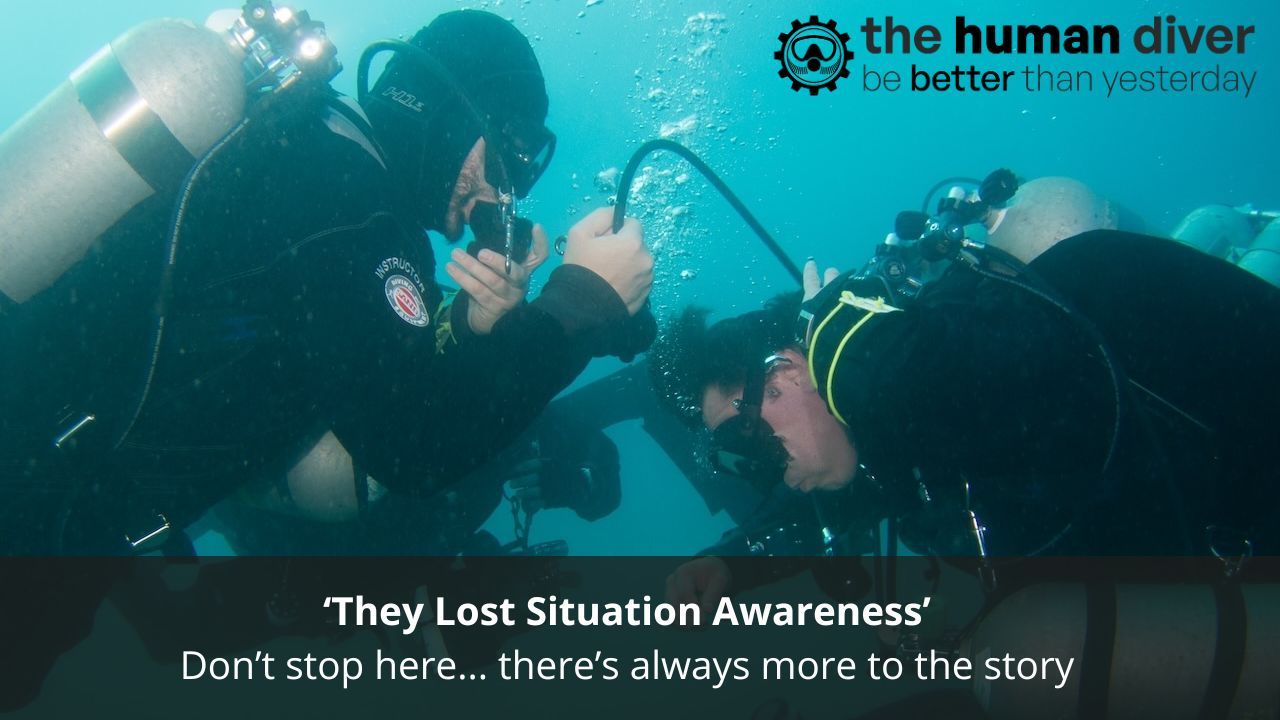
'They Lost Situation Awareness'
Apr 22, 2025‘They lost situation awareness… pay more attention!’
How many times have you heard this phrase to explain why an adverse event occurred? Pick any online forum that discusses a diving incident and you’ll be sure to see numerous comments describing the cause as a ‘loss of situation awareness’, accompanied by an unsolicited recommendation to ‘pay more attention next time.’ The phrase ‘loss of situation awareness’ has become overused and in today’s lexicon is often synonymous with assigning blame or suggesting someone was careless. These types of simplistic explanations often fail to capture the context of the situation and contributory factors that led to the incident. They also tend to highlight the contributor’s misinterpretation of situation awareness and the luxury of hindsight. Using this phrase – loss of situation awareness – incorrectly may not seem consequential but it comes at the expense of real learning.
What is situation awareness?
Situation awareness, or SA, involves our individual ability to perceive the environment, comprehend the significance of the situation, and project what is going to happen next. We then use the information we’ve gathered to make a decision. A decision is executed and the process repeats itself.
- Perception of data and elements of the environment: This refers to our ability to gather information using our available senses – vision, hearing, touch, taste, and smell.
- Comprehension of the situation: This refers to our ability to take the information we’ve collected via our senses and couple it with our existing knowledge and experience.
- Projection of future events: Using the information we gathered and our existing knowledge to project what the future may hold.
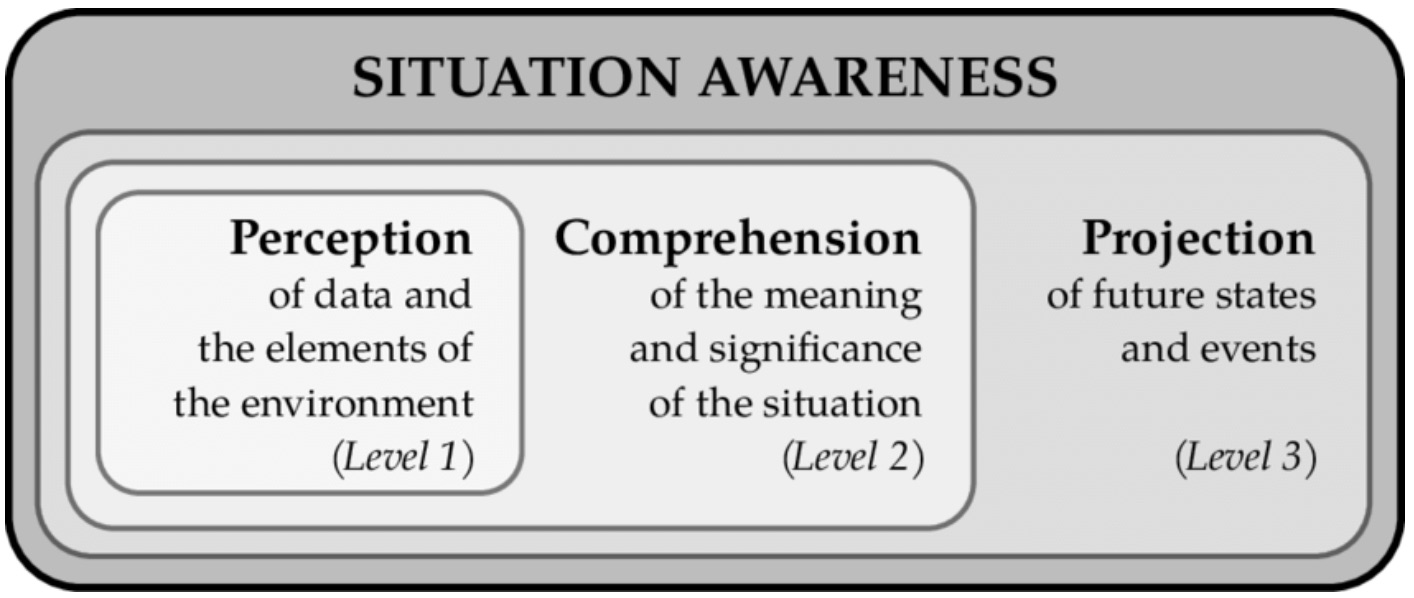
Here are two diving examples of this process in action:
- As you enter the water and descend, you feel pressure building in your ears. As the pressure builds, experience from previous dives tells you that if you continue to descend the pressure in your ears will continue to increase. Using this information you make a decision to Valsalva, equalizing pressure in your ears.
- At depth in a drysuit, you hit your minimum gas and begin your ascent. You sense yourself rising quickly as the volume of gas in your wing and drysuit expands. You know from previous dives you must release gas from your wing and drysuit to control your ascent. You do just that and ascend to the surface in a controlled manner.
How we ‘lose’ situation awareness
- Fixation on single task: Think back to the first time you deployed a DSMB. Were you able to track your depth or the whereabouts of your diving partners at the same time?
- Failure to Communicate Effectively: When learning to dive, you were taught a number of hand signals to convey messages underwater. Initially unfamiliar with the signals, you signal you’re okay by giving a thumbs up. Everyone in the team acknowledges the signal and begins moving to the surface.
- Failure to comply with accepted practices: Marking cylinders with the gas mixture is (should be) a standard practice across the dive industry, as it lets everyone in the group know what’s in the cylinder. Imagine you’re on a liveaboard with a mix of recreational and technical divers. The rec divers are using AL80s with 21% and the tech divers are using AL80s filled with 100% O2, but no one has marked their cylinders. How do you know for sure what’s on your back before you enter the water?
- Other reasons include: lack of required information; reaching mental capacity; disagreement between two sources of information; confusion or uncertainty; and failure to communicate effectively.
It’s important to note you don’t know you’ve lost situation awareness until after you’ve already lost it. With the benefit of hindsight and full knowledge of the outcome, it’s easy to see how an outside observer can claim, ‘they lost situation awareness… end of story.’ However, this so-called explanation is not particularly helpful when conducting a post-mortem analysis.
When assessing how an event transpired, avoid asking, “Why did they do that?” Rather, you should ask, “How did it make sense for them to make that decision?” To truly learn from the event, move beyond simple explanations, demonstrate curiosity, and ask inquisitive questions:
- What was distracting the diver(s)?
- How do we know the dive brief was clear and understood by all members of the team?
- How can we improve communication?
- How do we ensure we follow standard operating procedures (SOP)? Do we need a new SOP because this a situation we haven’t experienced before?
- How do we ensure we're not are overly reliant on a single person to complete a task?
How to improve situation awareness
- Rehearsals, Rehearsals, Rehearsals: Conduct rehearsals on land before entering the water. Whether you’re deploying a DMSB, running a reel, executing a gas switch, or manipulating your dive computer, practice on land to build muscle memory before attempting underwater.
- Briefings: Before entering the water, hold a dive brief with your team. Briefings set the tone and expectations for the dive, building the team’s collective situation awareness. At The Human Diver, we recommend using the UNITED-C format.
- Debriefings: Regardless of how the dive went, a debrief should be completed. At a minimum, ask the team: What went well? Why did it go well? What will be improved? How to make the improvement?
Further reading from The Human Diver blog: Situation Awareness and Mental Models
Selective Attention Exists! 5 Tips to Increase Situational Awareness in Diving
Unleashing Your Sixth Sense: Building capacity and directing attention
Running out of gas- Why does this happen and how can we prevent it?
How do I improve my Situation Awareness?
You can't pay MORE attention: the myth of 'loss of situation awareness'

John Strobridge is one of the Human Diver instructors based in the US. Along with 12 other instructors, he helps divers and teams improve safety and performance by bringing human factors and just culture into daily practice. Through award-winning online and classroom-based learning programmes we transform how people learn from mistakes, and how they lead, follow and communicate while under pressure. We’ve trained more than 600 people face-to-face and 2500+ online across the globe, and started a movement that encourages curiosity and learning, not judgment and blame.
If you'd like to deepen your diving experience, consider the first step in developing your knowledge and awareness by taking the HFiD: Essentials class here.
Want to learn more about this article or have questions? Contact us.

